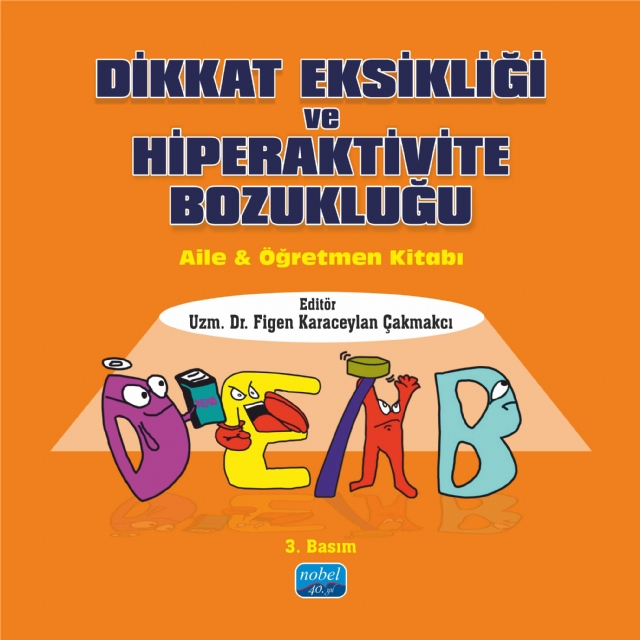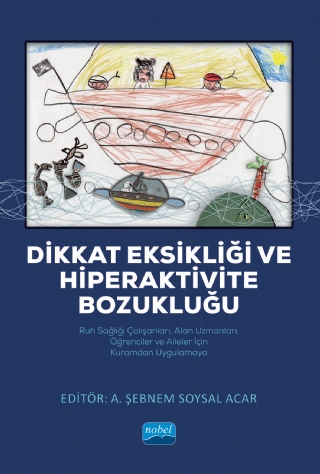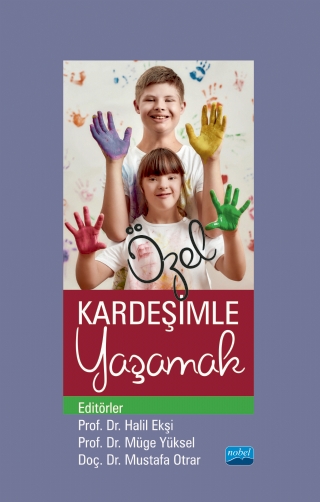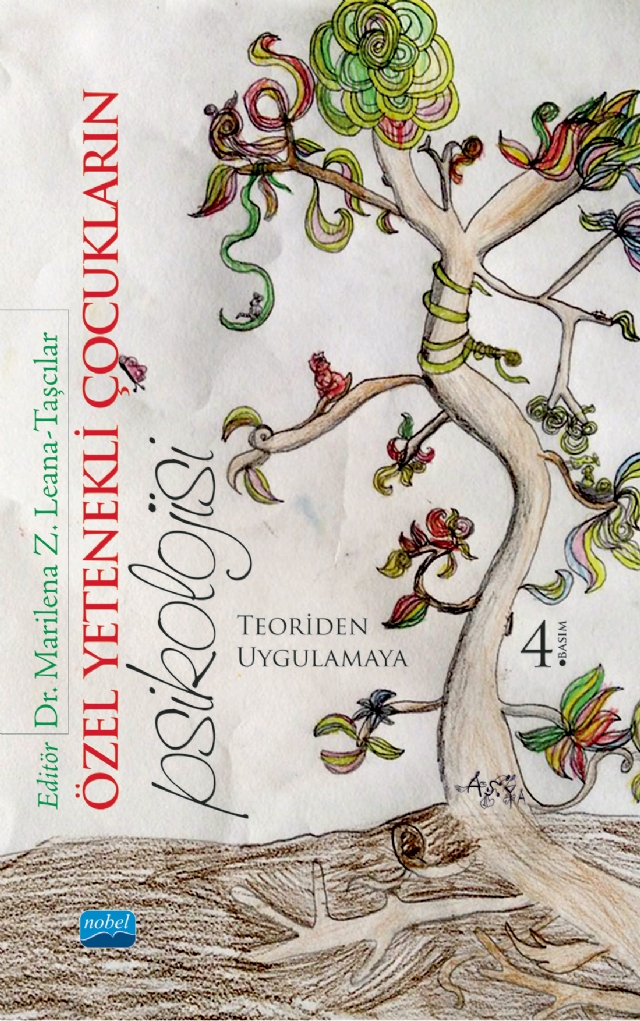Special Education \ 1-1

The baby, who has been interacting with other people since birth, communicates with these people through increasingly complex codes throughout his development. By climbing the developmental stages, the child acquires a set of skills ranging from eye contact to babbling, from gestures to first words, and from simple sentence combinations to complex sentences. Ultimately, the child who gains literacy skills continues to progress in language development through reading and writing. However, there may be some differences in the developmental process of the child, sometimes due to biomedical and sometimes environmental reasons. Speech and language therapists accompany children and their families who have a different language development adventure throughout this adventure.
This book arose out of a need for up-to-date and Turkish resources for speech and language therapy students and specialists, which are still developing in Turkey. In addition, each of them has been prepared by experts who continue their academic studies in this field for speech and language therapists and considering the child's language development steps. In this sense, it also aims to be a bedside source.
This book arose out of a need for up-to-date and Turkish resources for speech and language therapy students and specialists, which are still developing in Turkey. In addition, each of them has been prepared by experts who continue their academic studies in this field for speech and language therapists and considering the child's language development steps. In this sense, it also aims to be a bedside source.

“Attention Deficit Hyperactivity Disorder” (ADHD) is a neuropsychiatric disorder that can disrupt an individual's social life, academic life and family relationships. Although it is a disease that can completely change the future of the child if it is not treated and intervened correctly, satisfactory answers begin to emerge as a result of the right approach and appropriate interventions.
In my 20-year career as a Child and Adolescent Psychiatrist, I have experienced many times that only drug therapy is not sufficient in the treatment of Attention Deficit and Hyperactivity Disorder. The fact that family attitudes and the interventions of the teacher in the classroom are as important as psychopharmacological treatment has motivated me to write such a book.
With this book, it is aimed to inform about the mistakes that we know to be true about Attention Deficit and Hyperactivity Disorder, which is heard by everyone and perhaps defined as today's fashion disease. In addition, it is aimed both to ensure that children with ADHD are understood and to strengthen effective behavior management for families and teachers by providing accurate information and tips to our families and teachers about the relationship between ADHD and learning, which causes misunderstandings and prejudices.
We hope that this book, which offers solutions suitable for the needs of children who are our future, will be a useful resource for everyone who reads it.
In my 20-year career as a Child and Adolescent Psychiatrist, I have experienced many times that only drug therapy is not sufficient in the treatment of Attention Deficit and Hyperactivity Disorder. The fact that family attitudes and the interventions of the teacher in the classroom are as important as psychopharmacological treatment has motivated me to write such a book.
With this book, it is aimed to inform about the mistakes that we know to be true about Attention Deficit and Hyperactivity Disorder, which is heard by everyone and perhaps defined as today's fashion disease. In addition, it is aimed both to ensure that children with ADHD are understood and to strengthen effective behavior management for families and teachers by providing accurate information and tips to our families and teachers about the relationship between ADHD and learning, which causes misunderstandings and prejudices.
We hope that this book, which offers solutions suitable for the needs of children who are our future, will be a useful resource for everyone who reads it.

Changing the world is about the way we experience it.
This book, which is a candidate to guide the curious about attention deficit hyperactivity disorder, actually allows us to meet a multi-layered public health problem. The reason why it is different from other books written on this subject so far is hidden in the way it deals with the subject. 96 scientists from 23 different professions tried to embrace today's most common neuropsychiatric disorder by signing 86 chapters. The purpose of this meeting is to draw a general framework for the most common neurodevelopmental problem of childhood, to turn "different" perspectives into "normal". This transdisciplinary meeting is never to reject and/or reduce the problem, but to create a roadmap to use all available resources effectively while struggling with a multi-layered situation.
This book, which is a candidate to guide the curious about attention deficit hyperactivity disorder, actually allows us to meet a multi-layered public health problem. The reason why it is different from other books written on this subject so far is hidden in the way it deals with the subject. 96 scientists from 23 different professions tried to embrace today's most common neuropsychiatric disorder by signing 86 chapters. The purpose of this meeting is to draw a general framework for the most common neurodevelopmental problem of childhood, to turn "different" perspectives into "normal". This transdisciplinary meeting is never to reject and/or reduce the problem, but to create a roadmap to use all available resources effectively while struggling with a multi-layered situation.

Are you ready for a journey in the world of music from past to present?
This book, which includes the history of music, basic music information, local and foreign music genres, musical instruments, dances and songs, is for everyone from early childhood with its colorful drawings and plain expression.
This book, which includes the history of music, basic music information, local and foreign music genres, musical instruments, dances and songs, is for everyone from early childhood with its colorful drawings and plain expression.

Such a book has been prepared in order to make students with different needs (mental, physical, visual, auditory, etc.) feel that they are valuable individuals for the society and to have fun learning the science concepts that are intertwined with daily life. Since it is thought that it can make the teaching process more enjoyable and create a basis for the permanence of knowledge, it was deemed appropriate to use intelligence games as a tool in this process. In order to enrich the content of science education teaching, we present our original and scientific book, Science Education and Activity Examples with Intelligence Games for Students with Special Education Needs, as an example to you, our valuable science teachers and education stakeholders.

It is obvious that the presence of a child with special needs at home affects all family members. The financial and moral efforts of parents to support the developmental processes of their children can sometimes lead to very tiring experiences. During this time, the needs of siblings with normal development also appear, but these needs can be ignored. It should not be forgotten that having a sibling with special needs can affect a child with normal development from career choice to character. When the domestic and international literature is examined, it is seen that support groups, psychological counseling and guidance activities are mostly focused on parents, but there is not much work on siblings. The book "Living with My Special Sister", whose main purpose is to fill this gap, includes a psychoeducation program to support secondary and high school students with special needs siblings in their problems, as well as psychological counselors, psychologists, special education specialists who work/will work in the field within the scope of rehabilitation counseling. and aims to be a guide for social workers. In the five different chapters in the book, a content that will provide clues about both the social perspective and the emotions experienced by family members and their coping methods is aimed. This study, which is planned without forgetting that the sibling with normal development, as well as the parents, has a common denominator, will further strengthen the family system.

The education of gifted and talented students, or as it has been called until today, is an area that has been known for a long time and is being developed. However, most of the studies carried out in our country focus mainly on meeting the educational needs of gifted children. Problems such as motivation, perfectionism, and math anxiety experienced by gifted children, their reflections on educational processes, and offering solutions such as bibliotherapy that can be used in support training rooms for these problems are issues that are not emphasized much. Therefore, this book; It aims to raise awareness of teacher candidates, teachers working in this field, psychological counselors, psychologists and parents of gifted children on these issues. For this purpose, academic theses and studies on the emotional problems of gifted children have been provided to you in a simpler language.
The common wish of all authors is to contribute to your being a high-aware supporter of the issues that our special talented/gifted children have emotional difficulties. We invite you to discover the inner worlds of gifted children! Happy reading….
The common wish of all authors is to contribute to your being a high-aware supporter of the issues that our special talented/gifted children have emotional difficulties. We invite you to discover the inner worlds of gifted children! Happy reading….

“My teachers; They said my mind was slow, that I was antisocial, and that I'd be dazed by my stupid dreams until I died."
Albert Einstein – Scientist
Specific Learning Disability (SLD); It is a neurobiologically based disorder that is often noticed with the beginning of the child's academic life, but if it is not detected and intervened by specialists, its lifelong effect compels the person to struggle in all areas of his life, and genetic and environmental factors are effective. The definition of "DYSLExia" is used more often than "Specific Learning Disorder", as it is often defined as only the difficulty experienced in the "reading" skill.
Although it is sometimes defined as "disorder", sometimes "disease", sometimes "difficulty", sometimes "difference", it is a condition independent of intelligence that seriously affects both social and academic life of the individual, but in some cases it is a mis-perceived "intelligence retardation". is a hassle.
ÖÖG; Since it is a difficulty that affects language development and use, verbal and written expression, literacy and mathematics skills, it can lead to school failure and additional school adjustment problems. Considering the importance of school life in the child's mental development, when not correctly detected and intervened, the accompanying Attention Deficit and Hyperactivity Disorder, Anxiety Disorders and Behavioral Disorders are often overlooked comorbid conditions and pave the way for the child to experience emotional trauma.
As a result of nearly 10 years of experience and experience, it was decided to write this book. Practical practices of a team of Child and Adolescent Psychiatrists and Child Psychologists were shared. I hope it will be used as a reference book about what are known to be true about SLD, the importance of early detection and correct intervention, and what the legal rights of the child with SLD are…
Albert Einstein – Scientist
Specific Learning Disability (SLD); It is a neurobiologically based disorder that is often noticed with the beginning of the child's academic life, but if it is not detected and intervened by specialists, its lifelong effect compels the person to struggle in all areas of his life, and genetic and environmental factors are effective. The definition of "DYSLExia" is used more often than "Specific Learning Disorder", as it is often defined as only the difficulty experienced in the "reading" skill.
Although it is sometimes defined as "disorder", sometimes "disease", sometimes "difficulty", sometimes "difference", it is a condition independent of intelligence that seriously affects both social and academic life of the individual, but in some cases it is a mis-perceived "intelligence retardation". is a hassle.
ÖÖG; Since it is a difficulty that affects language development and use, verbal and written expression, literacy and mathematics skills, it can lead to school failure and additional school adjustment problems. Considering the importance of school life in the child's mental development, when not correctly detected and intervened, the accompanying Attention Deficit and Hyperactivity Disorder, Anxiety Disorders and Behavioral Disorders are often overlooked comorbid conditions and pave the way for the child to experience emotional trauma.
As a result of nearly 10 years of experience and experience, it was decided to write this book. Practical practices of a team of Child and Adolescent Psychiatrists and Child Psychologists were shared. I hope it will be used as a reference book about what are known to be true about SLD, the importance of early detection and correct intervention, and what the legal rights of the child with SLD are…

This book was written to contribute to the formation of social awareness in this field by presenting the characteristics of gifted children and their education from different perspectives.
The main target audience of the book; parents, teachers, university students, academics and politicians who have gifted children.
The information in the book, related literature; It is supported by the statements of gifted children, teachers, mothers and fathers.
Some of the questions you can find answers to in the book are:
• What characteristics do gifted children have?
• How are gifted children recognized?
• What is the number of gifted people in Turkey?
• What are the needs of gifted children?
• Which models are used in the education of the gifted?
• What are the problems experienced by gifted children?
• How can these children be happy?
• What can teachers do in the education of these children?
• What can we do as families?
• What policies should be developed for these children?
The main target audience of the book; parents, teachers, university students, academics and politicians who have gifted children.
The information in the book, related literature; It is supported by the statements of gifted children, teachers, mothers and fathers.
Some of the questions you can find answers to in the book are:
• What characteristics do gifted children have?
• How are gifted children recognized?
• What is the number of gifted people in Turkey?
• What are the needs of gifted children?
• Which models are used in the education of the gifted?
• What are the problems experienced by gifted children?
• How can these children be happy?
• What can teachers do in the education of these children?
• What can we do as families?
• What policies should be developed for these children?